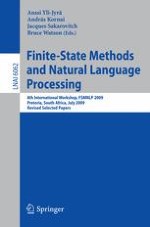2010 | Buch
Finite-State Methods and Natural Language Processing
8th International Workshop, FSMNLP 2009, Pretoria, South Africa, July 21-24, 2009, Revised Selected Papers
herausgegeben von: Anssi Yli-Jyrä, András Kornai, Jacques Sakarovitch, Bruce Watson
Verlag: Springer Berlin Heidelberg
Buchreihe : Lecture Notes in Computer Science
